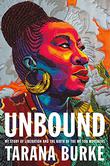Activist Tarana Burke is best known as the founder of the #MeToo movement confronting sexual violence against women and girls—a calling she has followed since 2006, long before the hashtag went viral. This year she delivered a powerful memoir, Unbound: My Story of Liberation and the Birth of the Me Too Movement (Flatiron, Sept. 14). Kirkus called the book “an unforgettable page-turner of a life story rendered with endless grace and grit;” it claimed a spot on our list of the Best Nonfiction of 2021. Burke answered a few questions by email.
How did you decide that it was time to tell your story in book form?
I am a writer. Over the last four years people have only gotten to know me in sound bites and news pieces. If I was ever going to tell the full story of how this work emerged, it would have to be in words, because they are where I find refuge and comfort. I can take my time and be deliberate and thoughtful. Four years after the fervor and immediacy of the hashtag, I think it was time to really take a deep dive into the origins of this work, and this was a way to get folks to actually listen.
What preparation did you do to write Unbound?
I am fortunate enough to have journals going back to the eighth grade. I also have been writing and blogging for many years, so I went back to old writing for some parts and then built off of what I had previously written. But I also talked to friends and family and college buddies and former co-workers and whomever I could think of to fill in the blanks. I thought I could just rely on my memory. My memories weren’t just incomplete—they were not fleshed out. I had to confront my own inclination for self-protection/-preservation in order to free the actual story that needed to be told.
What was it like having a book come out in 2021?
I was terrified to release a book in a pandemic, but the truth is that we are dealing with collective trauma. I think in some ways—even though Unbound was about surviving sexual violence—it resonated with the kinds of violence and trauma many of us have witnessed or experienced in the last two years. Also, these last couple of years have opened folks up to some self-exploration in unprecedented ways. I think books like mine help to validate those endeavors and allow people to feel supported and seen.
Who is the ideal reader for Unbound, and what do you hope they take away from it?
 That’s a funny question. The ideal reader is the person who has either tapped into their vulnerability enough to find a part of themselves in my story or empathetic enough to understand why stories like mine matter and should be written and read. I don’t know if I can dictate what people take away exactly, but my biggest hope is that people allow themselves to be open enough to find something for themselves or for someone else. I wrote this book for myself. I wrote this book for little Black girls like me who didn’t have a book like this. But this book is deeply universal—both extraordinary and ordinary—and I hope people can take that away.
That’s a funny question. The ideal reader is the person who has either tapped into their vulnerability enough to find a part of themselves in my story or empathetic enough to understand why stories like mine matter and should be written and read. I don’t know if I can dictate what people take away exactly, but my biggest hope is that people allow themselves to be open enough to find something for themselves or for someone else. I wrote this book for myself. I wrote this book for little Black girls like me who didn’t have a book like this. But this book is deeply universal—both extraordinary and ordinary—and I hope people can take that away.
What book most dazzled you this year?
I loved Long Division by Kiese Laymon. He is such a gifted writer, but with this novel he gave us a different gift. Rarely do we see speculative fiction with Black children at the center, and the wonderful storytelling made it all the more special. I love it when a story makes me dream of more stories.



































